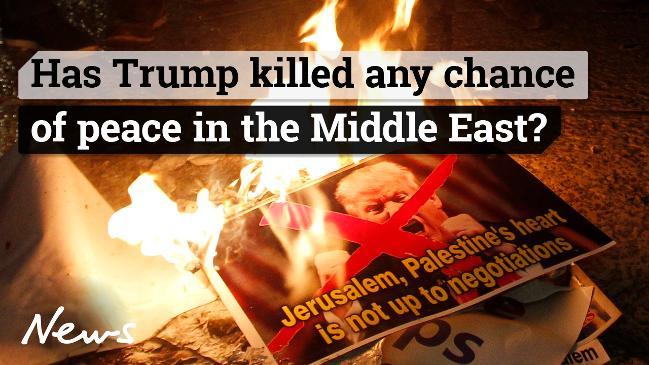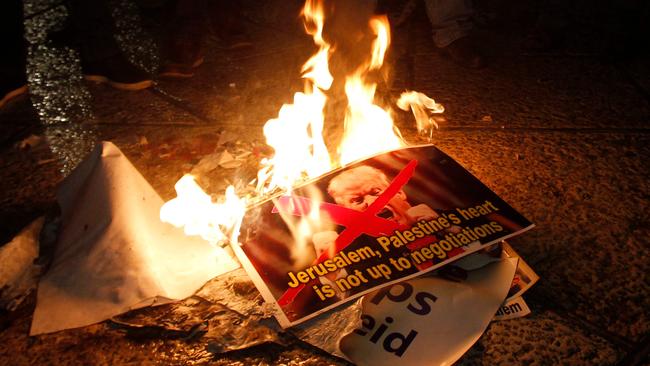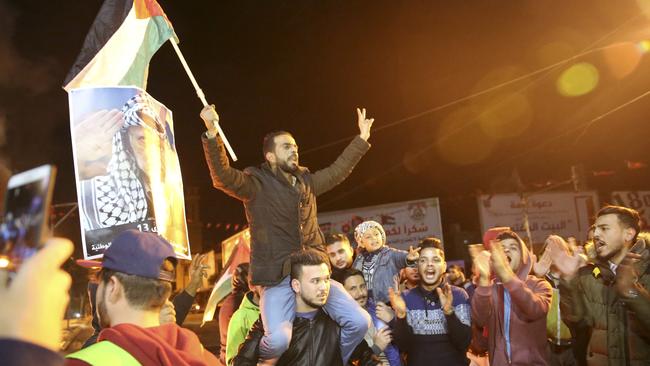What on earth was President Trump thinking?
WITH one short speech, 70 years of US foreign policy has been unravelled. So what does that mean for the future, Greg Barton asks.

Rendezview
Don't miss out on the headlines from Rendezview. Followed categories will be added to My News.
THIS is a question that could have been asked virtually any given week in 2017 but this time it might be even more monumental than most.
In a speech announcing that the US Embassy would be (eventually) moving to Jerusalem Trump explained that “Today, we finally acknowledge the obvious: that Jerusalem is Israel’s capital. This is nothing more, or less, than a recognition of reality. It is also the right thing to do. It’s something that has to be done.”
Which again begs the question, what was Donald Trump thinking?
Despite his words, there is little evidence to suggest that he has actually thought deeply about the path to peace in the Middle East. By now we know that he scarcely gives much thought to American politics, much less to international diplomacy. If he did, he surely would have worked harder to fill the dozens of empty ambassadorships in the Middle East, Asia and around the world (including one in Canberra). On his watch, Trump’s Secretary of State, Rex Tillerson is gutting the State Department of senior leadership and cancelling many of its most effective programs.
So what is Trump doing? He is doing what he does best: playing to his base. Ever since the 1980 presidential campaign that saw the not-so-Christian Ronald Reagan defeat the very-Christian Jimmy Carter, the strategy to secure the support of the Religious Right has been to promise them Jerusalem. Israel’s conservative Likud has played the same card in the US. Leveraging popular End Times convictions among America Christians that Jesus would return once The Temple is rebuilt in Jerusalem has been a cheap way of buying their support. Or, in other words, promise them everything but give them nothing once you make it to the White House.

This is an issue where it pays to listen to those who do actually know and care.
According to former American ambassador to Israel and Jewish academic Martin S. Indyk, “You can finesse this all you want, but Jerusalem doesn’t allow for any finesse ... They can try to limit the damage all they want, but they won’t be able to, because Jerusalem is such a hot-button issue.”
Daniel Kurtzer, another former US ambassador to Israel agrees, saying “One statement is going to undercut everything they want to do. It will take us out of the game. ... You want to shoot yourself in the foot — because it’s good for your base — but you’ve got to understand what you’re doing.”
And on the other side of the argument, of course, is the Palestinians.
“In one blow, President Trump has destroyed not only the chances of any peace but the stability and security of the region as a whole, Palestinian legislator Hanan Ashrawi told the New York Times.
“He has undermined his closest allies in the Arab world. He has given all extremists and nuts all over the world who are ready to commit acts of violence a perfect excuse because he has provoked spiritual sentiments and religious feelings to the point where we don’t know how far the ramifications will go.”

Jerusalem’s Christian leaders are no less concerned. On the eve of his anticipated announcement 13 Patriarchs and Heads of Churches in Jerusalem wrote to President Trump to tell the so-called leader of the free world, “Our solemn advice and plea is for the United States to continue recognising the present international status of Jerusalem. Any sudden changes would cause irreparable harm. We are confident that, with strong support from our friends, Israelis and Palestinians can work towards negotiating a sustainable and just peace, benefiting all who long for the Holy City of Jerusalem to fulfil its destiny. The Holy City can be shared and fully enjoyed once a political process helps liberate the hearts of all people that live within it, from the conditions of conflict and destructiveness that they are experiencing.”
Despite the recklessness of Trump, however, there is at least one glimmer of hope.
“By ending the fiction of the two-state solution, and moving the American embassy to Jerusalem, Trump has finally made explicit what we all knew implicitly,” commentator and author Haroon Moghul told NBC. “Thus disabused of the charade, the real work can begin. Namely, realising a solution that gives Israelis and Palestinians the equal dignity and sovereignty they deserve, which cannot be realised except through a shared state.”
Greg Barton is Professor of Global Islamic Politics at the Alfred Deakin Institute for Citizenship and Globalisation at Deakin University.
Originally published as What on earth was President Trump thinking?


